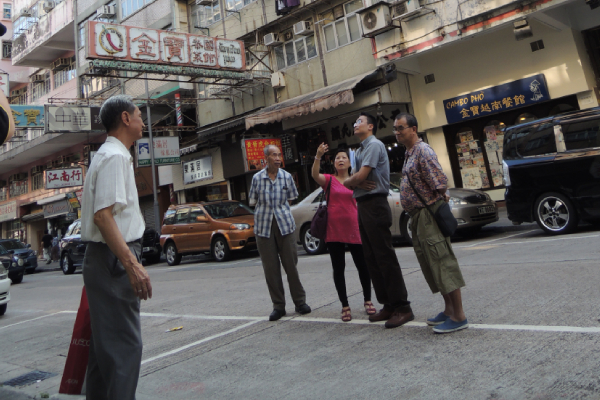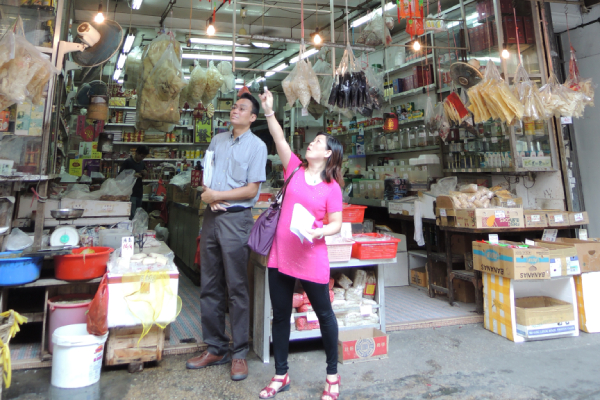Formulating an Urban Renewal Plan in Kowloon City
| Objective: |
|
| Scope: |
|
| Highlights : |
|


STAGE 1
The SIA is conducted in two stages:
- Stage 1 of the SIA comprises two parts, namely a Community Profile and a Questionnaire.
- Compilation of the Community Profile: To conduct an analysis of the livelihood of people to be affected by the PURPs and solicit views of stakeholderson the PURPs, the consultantsanalysed data from the 2011 census, and also conducted 22 face-to-face interviews, 5 focus group meetings and 8 site-visits. The interviewees included District Council members, social workers, business association and religious leaders, local-concern groups, residents (including rooftop dwellers and ethnic minorities) and operators of vehicle-repair workshops, funeral, jewellery and catering industries in the district.
- Questionnaire: A total of 1,138 questionnaires were received from residents and shop operators to assess the social impacts of the PURPs on the affected areas.
- After analysing the community profile and the SIA questionnaire, the SIA consultants submitted the findings to the planning consultants, who revised the urban renewal areas in the PURPs with reference to the relevant information. In addition, the SIA consultants conducted focus-group meetings with different stakeholders, and assisted the planning consultants to collect views from different industries, especially the funeral services and vehicle-repair industries, on the planning proposals. The aim was toinvestigate the feasibility of setting up a vehicle-repair centre or centralising the funeral services industry, to help the planning consultants formulate suitable land-use planning proposals
- The Stage 1 SIA revealed that the elderly, new arrivals, ethnic minorities and rooftop dwellers are more affected by the URP, and they can be classified into owners and tenants. In Stage 2 of the SIA, the consultants further investigated the negative effects of the URP on these groups, and developed specific recommendations and mitigation measures.
STAGE 2
The Stage 2 SIA comprised the following three parts:
- Updating of the community profile: The demographic statistics were updated on the basis of the revised urban renewal areas.
- Collection of comments from concerned social groups: Apart from analysing the data collected from the Stage 1 SIA focus-groups and questionnaires, the consultants contacted theowners, tenants (including new arrivals), the elderly, ethnic minorities and rooftop dwellers within the affected areas, and conducted eight focus-group meetings. The consultants also briefed the stakeholders and solicited views from the public on theproposed mitigation measures. In addition, the consultants distributed questionnaires to the participants of the community workshop participants to further consult them on the mitigation measures.
- Review the existing supporting services and measures relating to urban renewal: Seven face-to-face interviews with relevant government departments and local organisations were conducted, and information from other channels was collected to analyse the inadequacy of the existing urban renewal related services and schemes, with a view to recommending areas for enhancement.
- After conducting the above-mentioned SIA, the consultants proposed appropriate social impact mitigation measures.
OUR EXPERTS

Impacts
- Ho, Wing Chung; Cheung, Chau Kiu, Chan; Kwok Hong; Au, Chi Kin; Ma, Kun; & Wong, Hok Man (2012). Urban Renewal Plan for Kowloon City: First Stage Social Impact Assessment (Working Report) (in Chinese). Hong Kong: DURF;
https://ssweb.cityu.edu.hk/system/files/2025-03/Stage 1 SIA Report (Chi).pdf - Ho, Wing Chung (2014a). Urban Renewal Plan for Kowloon City: Social Impact Assessment (Executive Summary) (in English). Hong Kong: DURF;
https://ssweb.cityu.edu.hk/system/files/2024-09/SIA-ES.pdf - Ho, Wing Chung (2014b). Urban Renewal Plan for Kowloon City: Social Impact Assessment (Final Report) (in Chinese). Hong Kong: DURF;
https://ssweb.cityu.edu.hk/system/files/2025-03/Final SIA Report(Chi).pdf - Ho, Wing Chung (2014c). Urban Renewal Plan for Kowloon City: Social Impact Assessment (Final Report) (in English). Hong Kong: DURF; https://ssweb.cityu.edu.hk/system/files/2025-03/Final SIA Report (ENG).pdf
Photo Credit: Artwork by Urban Renewal Plan for Kowloon City on @kcrenewal.
Research Interests
- Social Problems and Social Development in Chinese Societies
- Social and Sociological Theories
Research Grants
- Unravelling Ambivalent Mobilities: The Social Memory, Bicultural Identity and Livelihood Strategies of Young Dam Migrants in Guangdong, General Research Fund (GRF) , UGC, Amount: HKD $466,900, 1 Jan 2017 - 31 Dec 2018.
- Engaging Adolescent Residents in Revitalizing a Remote Chinese Migrant Community: An Exploratory Study of Tin Shui Wai through Photovoice and Focus Group, Start-up Grant for New Staff (CityU Project No.: 7200155), City University of Hong Kong CityU, Amount: HKD $99,900, 2009.
- In Search of Family-friendly Policies in Low-income Neighbor, Granted by UGC-Public Policy Research (RGC Ref. No: CityU 10, Amount: HKD $327,860, 2007.
Publications
- Ho, Wing-Chung & Tran, Emile (2019) “Hong Kong-China Relations over Three Decades of Change: From Apprehension to Integration to Clashes.” China: An International Journal, 17(1):173-193. [SSCI-listed: Area Studies, 65/74] .
- Hsu, Ho; Ma, Kun; Ho, Wing-Chung (2019) “Forced Migration and Political Functions of the Three Gorges Project in China” Journal of Comparative Asian Development, 17(2): 62-77.
- Ho, Wing-Chung & Lu Jian (2019) “Culture vs. the State? The “Defend-my-mother-tongue” Protests in Guangzhou.” The China Journal, 81(1):81-102. [SSCI-listed: Area Studies, 1/74] .
- Cheung, Chau-kiu; Chung, Siu Fung; Ho, Wing-chung Ho; & Fung, Elijah (2017) “Employers’ Concern does not Help Female Foreign Domestic Workers Sustain Quality of Life in Hong Kong.” Asia Pacific Journal of Social Work and Development, 27:3-4, 174-186 .
- Ho, Wing-Chung & Cheung, Chau-Kiu. (2016). “Migrant Families as Effective Buffers against Discrimination: The Perceived Work/Care Conflict and Household Conditions of Mothers.” Journal of Social Work, 16(2): 155-173 [SSCI-listed: Social Work, 24/42] .
- Ng, Petrus; Ho, Wing-Chung; Tsun, Angela; & Young, Daniel K. W. (2016) “Coping with Bereavement of Widows in the Chinese Cultural Context of Hong Kong.” International Social Work, 59(1): 115-128. [SSCI-listed: Social Work, 35/42] .
- Wong, Hok-Man & Ho, Wing-Chung (2015). “Roles of Social Impact Assessment Practitioners.” Environmental Impact Assessment Review, 50: 124-133. [SSCI-listed: Environmental Studies, 14/105] .
Impact Person
Dr. HO Wing Chung


